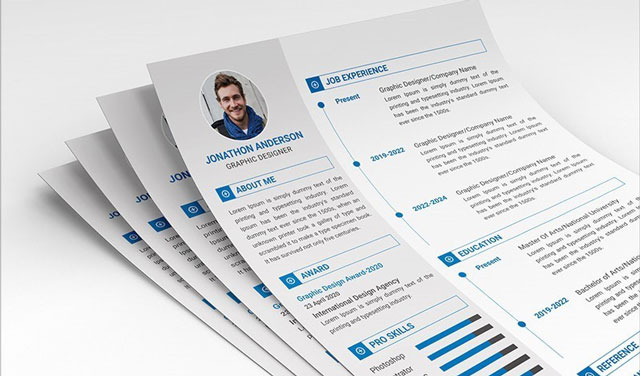The top 10 CV mistakes have pointed the most commonly made and ignored mistakes when writing your resume for a job search. One major document in any job application is a compelling CV download here that would catch the attention of the employers. The contents of a CV must be structured to the job requirements without over-exaggeration.
Hence, if your job hunt hustle is not yielding any result in the long run. you not receive an interview invite, or any favourable reply from the company you find interest in, then review those documents you send to represent you in front of your employer.
Something ain’t right and we all know it might be as a result of the following
- Submitting wrong documents
- Not meeting up with the requirements
- Late submission
- Applying for the wrong job
- Falsification
- Typo in your CV and cover letter
Our focus on this article will be the last reason. because of this, We’ve compiled a list of the 10 most common CV mistakes that lead to rejections and surveyed a group of recruiters to rate how damaging each one is.
READ ALSO: HOW TO UNDO ERRORS IN YOUR JOB APPLICATION SENT THROUGH EMAIL
Top 10 CV mistakes graduates and job seekers make and ways to avoid them is an article that has been properly written to list the common mistakes found in a CV and ways to avoid each.
OUR RESEARCH METHOD FOR THE TOP 10
We have questioned graduate employers about their top reasons for rejecting graduate CV and these are the results. Commit any of these top ten CV blunders and be rejected for job offers.
Graduate from across different geographic space who actively search for job opportunities often neglect the professionalism of their CV and overlooking the little unsuspecting mistakes they make when developing their CV for the future job hunt.
ALL YOU NEED: GLO GRADUATE RECRUITMENT PROCESS
TOP 10 CV MISTAKES MAKE AND WAYS TO AVOID THEM.
Errors or mistakes that are most commonly detected in a graduate CV includes
- Typographical errors
- Omitted information
- Wrong format
- Falsification
- Not tailoring your CV to the target role
- Adding an unprofessional email address
Employers consider these errors as being unprofessional and careless on the side of the applicants and thus a bad sign, the graduate is further encouraged to review and proofread their CVs before sending out the CV to the recruiter.
Read on to get more details…
1.) Applying for the wrong job position
Before you proceed with any job application ensure you go through the job details and requirements to know the jobs suitable to your qualifications. But surprisingly, many job applicants don’t do this and they end up sending a CV tailored to a completely different role, but not advisable if you want to be considered for the job.
2.) Spelling and grammatical errors
As an employer of labour would you rather employ a candidate with good English language skills or a candidate with a poor English language skills, you sure know the answer and recruiters can simply find out by merely scanning through your CV for grammatical errors. With the abundance of spell-checking software available, there is no excuse to send a CV with spelling or grammar errors, all that this demonstrates to an employer is a lack of attention to details and carelessness. to avoid this deadly mistake to ensure to proofread your resume and application letter or ask a friend or relative to review it for you
3.) Lack of knowledge about the job role
Research about the job you wish to apply for and read through the job requirements to know the job role. This should enable you to tailor your CV to a particular job. Employers are usually interested in a specialized CV than generalized ones and this cannot be achieved if you lack knowledge about the job descriptions. hence every job should have it own unique resume, and no two positions should be applied using the same resume, one either suffers or both suffers.
4.) Complicated layouts with poor hierarchy
Graduate employers often have many CVs to look through for each role and the last thing they want to do is to strain their eyes and spend time on a particular CV trying to understand its content; They don’t have time to waste trying to navigate a complicated CV layout. The simpler you make your layout, the easier you make their job hence they are much more likely to focus on the content of your CV. Huge unbroken paragraphs of text are a reader’s worst nightmare – especially when those readers are looking at hundreds of CVs every week.
5.) Formatting errors
These include the use of different font type, the use of many different colours that don’t blend and that are not a perfect combination, or the use of different font size are the few of the numerous formatting errors graduates make in their CVs. Try making your CV as simple as possible and use little or no formatting style to increase the readability and also your chances for the job.
6.) Lacking evidence
Telling your employer on the CV that you have all the skill that makes you perfect for the job without supporting them with relevant evidence for the benefit of the doubt employers may have in this case is one in many errors that should be looked out for and avoided. Always include supporting evidence for any skill you add to your CV, and ensure the employer doesn’t harbour doubt when reviewing your CV.
It’s great to demonstrate your skills and abilities in your CV but you also need to show what sort of impact they make on an employer.
Don’t simply state your responsibilities and knowledge – but go on to explain the results of your skills when you apply them.
7.) Falsification of information
This is the last thing you ever want to do, to falsify information on your CV. If you eventually get the opportunity for an interview and you are asked to defend what has been written on your CV and you find it difficult to do so because you have falsified that information, you are sure to lose that particular job. some recruiters may however not bother asking you to defend them if you had not included them. Some developed countries consider this act as a crime punishable by law.
8.) CV is too long or short
As a graduate, your CV should be at most 2 pages long (for an internship it can be one or two pages), but if you have relevant information and work experience that will enhance your chances in the consideration for an interview, you should not bother if your CV pages exceed 2, make sure you include all those information.
9.) Inconsistency of information
Date overlaps or a particular period in time was omitted, padding your CV with extra information, or missing out something vital part of your life accomplishments is a warning signal to employers. Make sure that your CV contains only relevant information for the role you are applying for and also ensure the information provided are accurate and consistent especially dates chronologically.
Start each role with a summary of what your employer/team does and how your work contributes to the organisation at a high level.
10. ) Being unable to open the CV
It sounds silly, but if an employer can’t open your CV in any method they choose they are unlikely to have the time to chase you for one they can open. Make sure you put your CV in a common format, such as a compatible version of the word doc. or a PDF as required by the employers
Having read this article and understand its contents. This has given you an added advantage over other job applicants. Ensure you go through your CV and identify all errors that have been highlighted in this article and make your CV stand out.
In summary and conclusion, other related CV mistakes most common to job seekers especially for graduate-level jobs include
- No proofreading
- Not tailoring your CV
- Not telling your referees in advance
- Too long, too short CV.
- Inconsistency of information
- Falsification of information
- Lacking evidence
- Formatting error
- Lack of knowledge about the job role
- Applying for the wrong job
ULTIMATE INTERVIEW GUIDE FOR GRADUATES LEVEL IT/TECH JOBS
After going through this article I hope you have been enlightened on the need to look out for these little and unsuspecting errors when writing your graduate CV for a professional job.






